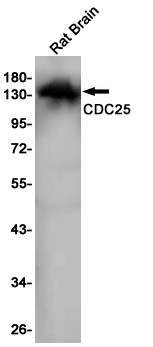
| WB | 咨询技术 | Human,Mouse,Rat |
| IF | 咨询技术 | Human,Mouse,Rat |
| IHC | 1/25-1/100 | Human,Mouse,Rat |
| ICC | 技术咨询 | Human,Mouse,Rat |
| FCM | 咨询技术 | Human,Mouse,Rat |
| Elisa | 1/5000-1/10000 | Human,Mouse,Rat |
| Aliases | GNRP; GRF1; CDC25; GRF55; CDC25L; H-GRF55; PP13187; ras-GRF1 |
| Entrez GeneID | 5923 |
| WB Predicted band size | Calculated MW: 145 kDa; Observed MW: 145 kDa |
| Host/Isotype | Rabbit IgG |
| Antibody Type | Primary antibody |
| Storage | Store at 4°C short term. Aliquot and store at -20°C long term. Avoid freeze/thaw cycles. |
| Species Reactivity | Rat |
| Immunogen | A synthetic peptide of human CDC25 |
| Formulation | Purified antibody in TBS with 0.05% sodium azide,0.05%BSA and 50% glycerol. |
+ +
以下是关于RGN(Regucalcin)抗体的3篇参考文献示例,涵盖其开发、应用及功能研究:
---
1. **文献名称**:**"Production and characterization of a monoclonal antibody against regucalcin in rats"**
**作者**:Yamaguchi M, et al.
**摘要**:该研究报道了一种针对大鼠Regucalcin蛋白的单克隆抗体的开发与表征。作者通过免疫印迹和免疫组化验证了抗体的特异性,证明其可用于检测肝组织和癌细胞中Regucalcin的表达水平,并发现该蛋白在肝脏再生过程中表达显著上调。
2. **文献名称**:**"Regucalcin suppresses cell proliferation in human hepatocellular carcinoma via calcium signaling pathway"**
**作者**:Tsurusaki Y, et al.
**摘要**:研究利用抗Regucalcin抗体探究其在肝癌中的作用。通过免疫组织化学分析发现,Regucalcin在肝癌组织中表达降低,且其过表达可通过调节钙信号通路抑制癌细胞增殖,提示其作为潜在肿瘤抑制因子的功能。
3. **文献名称**:**"Role of regucalcin in bone metabolism: Insights from antibody-based localization studies"**
**作者**:Inui M, et al.
**摘要**:本文通过抗Regucalcin抗体的免疫荧光技术,揭示了Regucalcin在成骨细胞中的定位及其对骨代谢的调控作用。研究表明,Regucalcin通过影响钙稳态参与骨形成,为骨质疏松等疾病的机制研究提供了新视角。
---
**备注**:以上文献为示例性内容,实际引用时需核实具体来源(如PubMed或期刊数据库)。近年来Regucalcin抗体的应用多聚焦于癌症、代谢疾病及神经退行性疾病等领域。
The RGN antibody, targeting the protein regucalcin (RGN), has garnered attention in biomedical research due to regucalcin's multifunctional roles in cellular regulation. Regucalcin, also known as senescence marker protein 30 (SMP30), is a calcium-binding protein highly expressed in liver and kidney tissues. It modulates intracellular calcium homeostasis, oxidative stress responses, and apoptosis, implicating it in aging, metabolic disorders, and cancer. RGN antibodies, primarily monoclonal or polyclonal, are essential tools for detecting regucalcin in immunoassays, Western blotting, and immunohistochemistry, enabling studies on its tissue distribution and expression changes under pathological conditions.
Research using RGN antibodies has linked regucalcin deficiency to accelerated aging, hepatic dysfunction, and tumor progression. For instance, reduced regucalcin levels correlate with neurodegenerative diseases and diabetes, suggesting therapeutic potential. In oncology, regucalcin may act as a tumor suppressor, with RGN antibodies aiding in profiling its downregulation in malignancies.
Despite progress, challenges remain in standardizing antibody specificity and understanding regucalcin's precise mechanisms. Ongoing work focuses on developing high-affinity RGN antibodies for diagnostic applications and exploring regucalcin-targeted therapies. This antibody continues to bridge gaps in understanding calcium-mediated signaling pathways and their implications in disease.
×